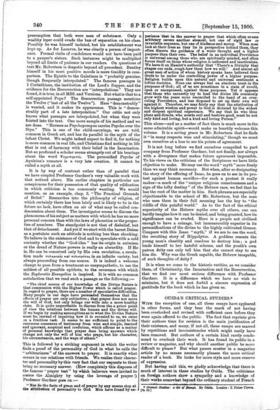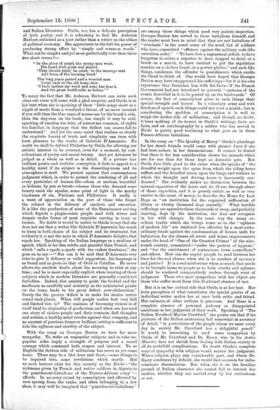OUIDA'S CRITICAL STUDIES.*
WITH the exception of one, all these essays have appeared in other forms, and they bear the mark of not having been overlooked and revised with sufficient care before they were again offered to the public. The fact that reprints give their authors time for revision is the main justification of their existence, and many, if not all, these essays are marred by repetitions and inconsistencies which might easily have been removed. But authors of a certain kind rarely conde- scend to overlook their work. It has found its public in a review or magazine, and why should another public be more difficult to please P But what passes muster in a magazine article by no means necessarily pleases the more critical reader of a book. He looks for more style and more reserve of expression.
But having said this, we gladly acknowledge that there is much of interest in these studies by Ouida. The criticisms on foreign authors show a sympathy and a knowledge of their works somewhat beyond the ordinary student of French _ .
• Orstioai Studies: ward e /mays. By OW*. London : T. Fisher trawl'. [71. 6d.]
and Italian literature. Ouida, tco, has a delicate perception of lyric poetry, and it is refreshing to find Mr. Auberon
Herbert criticised as a poet rather than a writer on the ethics of political economy. She appreciates to the full his power of producing strong effect by " simple and common words." What can be simpler and yet more pathetically true than these two short verses
" In the glory of youth the young man went, His heart with pride was stirred. • They should yield,' he cried, 'to the message sent And force of the burning word.'
The long years passed and a wearied man Crept back to the old home door.
• I have spoken my word and none has heard, And the great world rolls as before.' " To many the fact that Mr. Auberon Herbert can write such clear-cut verse will come with a glad surprise, and Ouida, is at her best when she is speaking of these " little songs short as a ripple of music from a woodlark's throat, of no more account if you will than the blue stars of mouse-ear by the brook's side, than the dog-rose on the bank ; too simple it may be said, speaking of emotion too trite, of sorrow too common, of sights too familiar., in language that the dullest can scarce fail to understand." And yet the same mind that realises so clearly the exquisite beauty of truth and simplicity can turn with keen pleasure to the works of Gabriele D'Annunzio. No doubt we shall be dubbed Philistine by Ouida for allowing our artistic interest to be overcast, even for a moment, by con- siderations of purity and moral beauty. And yet Art must be judged as a whole as well as in detail. If a picture has
brilliant points and realistic conception, it fails to appeal to a healthy mind if its subject is the dissecting-room and its atmosphere is mud. We protest against that contemptuous judgment which, in order to permit the rendering of all and every particular of human life—clean or unclean, beautiful or hideous, by pen or brush—classes those who demand some beauty amid the squalor, some point of light in the murky blackness- of sin, Puritans and Philistines. It really is a want of appreciation on the part of those who forget the subject in the delicacy of analysis and execution. It is like the production of some of the Renaissance carving which depicts a plague-eaten people mad with terror and despair under forms of most exquisite carving in ivory or bronze. No doubt it would be unfair to Oujda to say that she does not see that a writer like Gabriele D'Annunzio has much to learn in both choice of his subject and its treatment, but evidently it is not the mire in which D'Annunzio delights that repels her. Speaking of the Italian language as a medium of speech, which is far less subtle and graceful than French, and which " calls a spade a spade with the rudest frankness," she
goes on to say :—" Nor can it be said that D'Annunzio ever tries to give it delicacy or veiled suggestion; his language is as broad and as gross as that of Ovid or Catullus. He never allows the smallest doubt about his meaning to exist at any time ; and he is most especially explicit when treating of those subjects which in modern literature are generally considered forbidden. Indeed, this anxiety to paint the brothel and the madhouse as carefully and minutely as the miniaturist paints on the ivory, leads to his great defect, over-elaboration."
Surely the far greater defect is to make his stories centre round such-places. When will people realise how very dull and limited vice is P The easiness of becoming vicious is of itself fatal to originality of production, and when one has read one story of vicious people and their common, dull thoughts and actions; a healthy mind revolts against that company, and no amount of precious frame or brilliant setting is sufficient to hide the ugliness and sterility of the subject.
With the essay on Georges Darien we have far more sympathy-. To write on unpopular subjects and to take un- popular sides imply a strength of purpose and a moral
courage which command both respect and interest. To us English.the darkest side of militarism has never as yet come home. There may be a blot here and there,—some things to
be inquired into, some revelations which startle. But no such horrors exist for this country as the Biribi—" the nickname given by French and native soldiers in Algeria to the punishment-battalions of the Franco-African army "— affords. In an army raised by conscription and officered by men sprung, from the ranks, and often belonging.to a low
class, it may well be imagined that " punishment-battalions
are among those things which need very jealous inspection. Georges Darien has served in those battalions himself, and the reader must bear in mind that they are not battalions of "criminals" in the usual sense of the word, but of soldiers who have committed " offences against the military code (the unwritten code)." " To have lost a regimental article, to have forgotten to salute a superior, to have stopped to drink at a brook on a march, to have omitted to put the regulation number on a clothes brush, or a pewter platter," and such like things, condemns the offender to punishments which curdle the blood to think of. One would have hoped that Georges Darien may have exaggerated his sufferings—for it is his own experience that furnishes him with his facts—if the French Government had not interfered to prevent " cartoons of the events described in it to be posted up on the boulevards." Of course, the fact of conscription gives to such things their special strength and horror. In a voluntary army and with freedom of speech such things could not exist a month ; but in considering the problem of conscription it is well to weigh the darker side of militarism; and though, no doubt, it loses nothing of its horror in Ouida's writings, facts are facts, and an autobiography by a soldier who has served in Biribi is pretty good testimony to what goes on in these Franco-African battalions.
In the essay on " The Quality of Mercy" Ouida's pleadings for her dumb friends would come with greater force if she had been calmer in her denunciations. It cannot be denied that there is far less consideration shown for animals which are for use than for those kept as domestic pets. But Ouida does little good to the cause when she speaks of " the dreadful weight upon the spine from which the riding horse suffers and the dreadful strain upon the lungs and withers to which the draught and driving horse is incessantly con- demned.". She evidently makes no distinction between the natural capacities of the horse and its ill-use through abuse of those capacities, and it is grossly unfair, as well as very unwise in the cause of mercy, to describe the Home for Lost Dogs as " an institution for the organised suffocation ..of fifteen or twenty thousand dogs annually." What terrible sufferings are spared to these thousands of stray, and probably starving, dogs by the institution, she does not recognise in her wild charges. In the same way the many ex- cellent truths which she brings home as to the " ugliness of modern life " are rendered less effective by a most extra- ordinary tirade against the condemnation of houses unfit for habitation, for she classes all street and house improvements under the head of " One of the Greatest Crimes " of the nine- teenth century, committed—" under the pretext of hygiene," and " for the enrichment of contractors, town councillors," and others. How can she expect people to read between her lines for the real abuses when she is so careless of accuracy and justice ? It is a real misfortune when so much that needs to be brought home to people as to both cruelty and ugliness should be rendered comparatively useless through want of judgment. Those who most sympathise with her object are those who suffer most from this ill-advised absence of tact.
But it is on her critical side that Oujda is at her best. Her keen perception of what constitutes the special genius of an individual writer makes her at once both critic and friend. Her estimate of other authors is generous. And there is a complete absence of personal jealousy or disappointed ambitions in her judgment of their work. Speaking of " The Italian Novels of Marion Crawford," she points out that if his pictures of the Italian aristocracy fail somewhat in accuracy of detail, " in portraiture of the people whom we meet every day in society Mr. Crawford has a delightful pencil." It would be interesting to read some comparison by Ouida of Mr. Crawford and Dr. Barry, who in his Arden Massiter does not shrink from dealing with Italian society in all its multifold complications. No doubt Ouida's complete want of sympathy with religion would narrow her judgment. Where religion plays any considerable part, and where Dr. Barry condemns by default, she would find occasion for indis- criminate denunciation. But when she is on the familiar ground of Italian character she cannot fail to interest her readers, whether they are carried away by her enthusiasm or not.







































 Previous page
Previous page